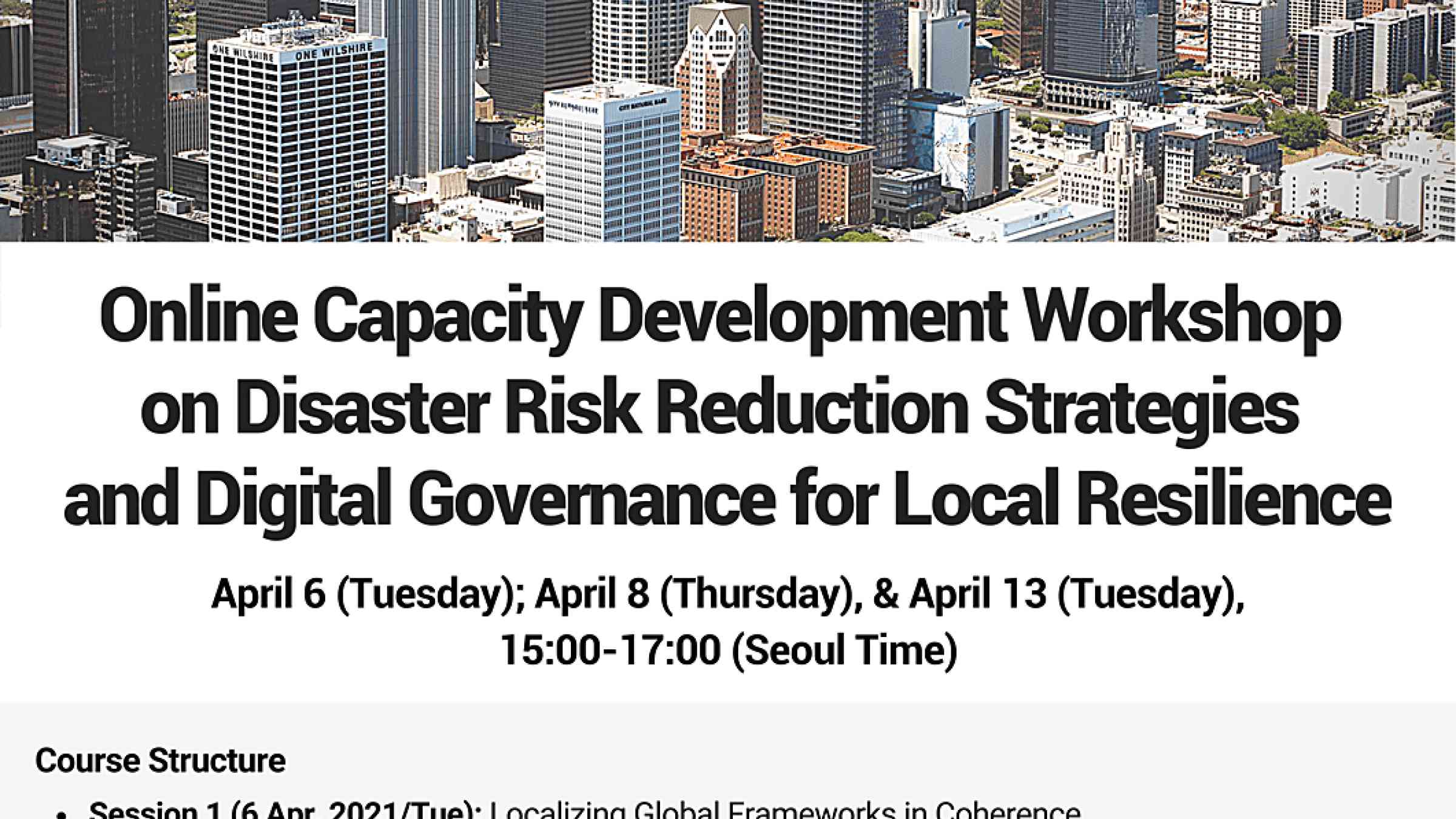Online Capacity Development Workshop on Disaster Risk Reduction Strategies and Digital Governance for Local Resilience

Workshop Date & Time
Date: 6 April (Tuesday); 8 April (Thursday) & 13 April (Tuesday)
Time: 15:00-17:00 (Seoul Time)
Duration: 2 hours
Target: Countries of the Asia-Pacific Region
Background
Cities are hubs for ideas, commerce, culture, science, productivity, social development and much more. At their best, cities have enabled people to advance socially and economically. Now that half of the world's population live in cities, making sustainable and resilient cities - amidst a changing climate, rapidly depleting resources, and unplanned urbanization - is one of our most significant challenges and opportunities.
The engagement of cities and local authorities has been at the forefront of COVID-19 response. Therefore, cities' planning and development must now give adequate consideration to biological hazards such as pandemics. It is highly encouraged for cities to build resilience through effective, inclusive and accountable institutions that ensure sustainable and inclusive development that addresses the root causes of existing risks and prevents new ones.
Accordingly, with the 2020 SDG progress report , the Asia-Pacific region needs to accelerate its progress on all 17 SDGs as per the current path; none of the 17 SDGs is on track to be achieved in the region by 2030. In this regard, building resilience and adapting to climate change, and adequately integrating health-related risk into local disaster risk reduction strategies is crucial, especially for cities in the Asia-Pacific region.
This training will provide concepts, tools and approaches for implementing the Sendai Framework for Disaster Risk Reduction 2015-2030 at the local level. It will also provide guidance for digital government for disaster risk reduction and resilience. The training structure includes lecture sessions with expert inputs. Session-based group work will enable participants to transform in-depth learning into practice and familiarize with coordinated action for decision making. By the end of the workshop, participants will be able to localize and implement the international frameworks into their city or national context to pursue greater resilience and sustainable development.
The training will also be an opportunity to learn about the global initiative on Making Cities Resilient (MCR2030) launched in 2020 to ensure cities become inclusive, safe, resilient and sustainable by 2030, contributing directly to the achievement of Sustainable Development Goal 11 (SDG11) and other global frameworks including the Sendai Framework for Disaster Risk Reduction, the Paris Agreement and the New Urban Agenda.
Workshop objectives
The online capacity development workshop will:
- Support the localization and implementation of the 2030 Agenda and the Sendai Framework for Disaster Risk Reduction 2015-2030;
- Learn about Ecosystem-based Disaster Risk Reduction
- Familiarize participants with MCR2030 and its diagnosis tools;
- Learn about Risk-Informed Governance for DRR and Resilience
Learning objectives
By the end of the training, participants will be able to:
- Understand the implications of the Sendai Framework for Disaster Risk Reduction for local authorities;
- Get familiar with approaches for integrating Ecosystem-based DRR in Local Development Strategies
- Build capacities with a focus on effective urban planning and digital government solutions
- Learn about MCR2030 and how to join this global initiative
- Utilize the operational tools of Sendai Framework at a local level to develop city action plans;
Structure
- Session 1: Tuesday, April 6, 2021 – Localizing Global Frameworks in Coherence
- Session 2: Thursday, April 8, 2021– Urban Resilience Tools and Digital Government Solution for DRR
- Session 3: Tuesday, April 13, 2021 – Towards Developing Local DRR Strategies
Methodology
The training will comprise lectures and presentations by experts, self-assessment exercise and group work, developing your city action plan.
Target audience
This training is open to national and local government officials and other stakeholders from civil society and institutions from countries of the Asia-Pacific Region, who are interested in or supporting cities in disaster risk management, climate change adaptation and sustainable development.
Organizers:
- UN Office for Disaster Risk Reduction ONEA & GETI
- UNITAR CIFAL Jeju/JITC
- UNDESA/ UNPOG
Certificate
UNITAR CIFAL Jeju/JITC, UNDRR and UNPOG will issue a certificate upon completion of the training.
Requirements:
- Attend at least two sessions
- Submit pre-training readings and assignments, i.e. case studies etc. actively participate in the training programme.
Application and deadline
Interested participants are required to complete the registration form by April 2.
For more information:
Ana Cristina Thorlund, Programme Officer, UNDRR ONEA & GETI at undrr-incheon@un.org
Editors' recommendations
Explore further
Also featured on
Is this page useful?
Yes No Report an issue on this pageThank you. If you have 2 minutes, we would benefit from additional feedback (link opens in a new window).